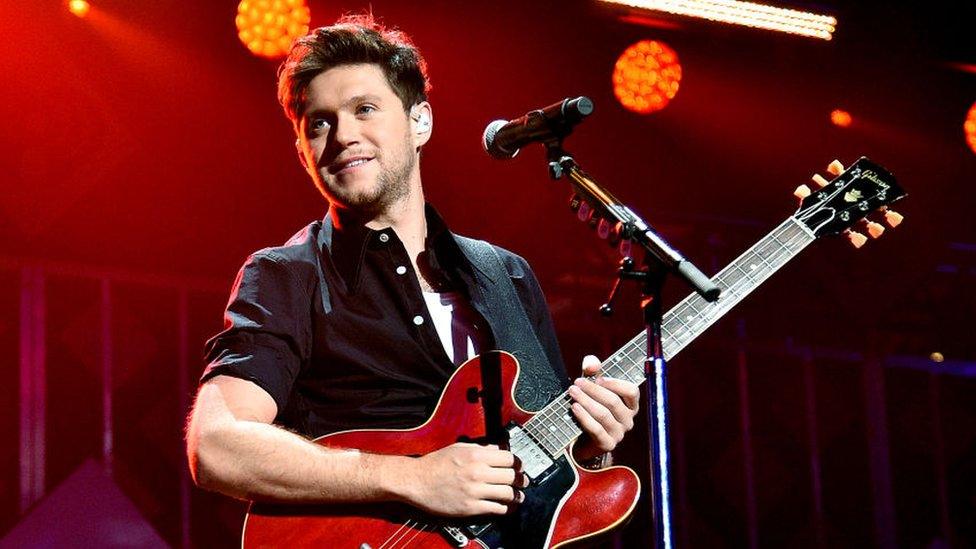Manic Street Preachers help disabled singer Ali Hirsz pay for surgery
- Published
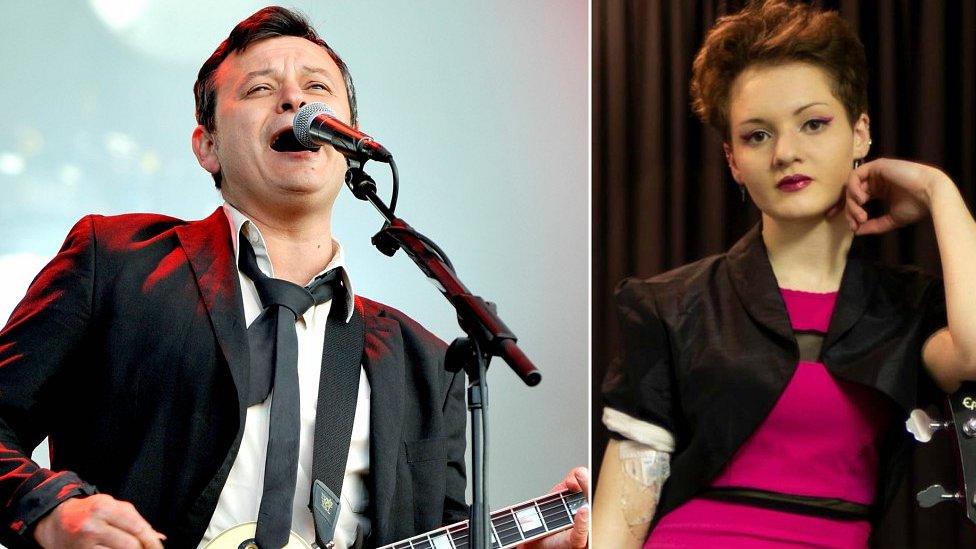
Ali Hirsz says she was "shocked" when the donation appeared.
A singer from Cambridge will be able to have vital surgery, thanks to the Manic Street Preachers.
Ali Hirsz needs the trapezius muscle that runs from her neck to her shoulder rebuilt, in an operation that isn't available on the NHS.
After Covid-19 robbed her of income from live music, she had to ask fans to help raise the money, external for the operation.
Her initial crowd-funding goal was £1,000 - but once she reached £500, the Manics stepped in and paid the rest.
When the donation arrived, "I was in tears," she tells the BBC.
"I love them anyway, they're such a great band, but £500 is so unbelievably generous. I thought, 'I can't believe they've done that.'
"It's such a relief."
Representatives for the Manic Street Preachers confirmed to the BBC that the donation had come from the band.
'Very stressful'
Hirsz, who sings with an indie band called Idealistics, has an incurable connective tissue disorder called Ehlers-Danlos syndrome.
The condition means "my skin is like tissue paper, it tears really easy," says the 20-year-old. A vascular compression on her small intestine also requires her to be fed via a tube.
She needs corrective surgery on her shoulder after a previous operation severed the nerve to her trapezius muscle, causing it to waste away. As a result, her shoulder blade dropped, affecting the blood supply to her arm.
The condition has already forced her to stop playing bass, as she has little feeling in her left hand.
She says she has "never asked for money before" and was "sweating with nerves" before posting her crowd-funding request last week.
But the campaign became necessary after coronavirus wiped out her band's concert diary; and Hirsz had to leave her day job as a horse trainer because she was shielding.
In the the meantime, she says, she received no financial support from the government's furlough or self-employment support schemes.
"It is very, very stressful, particularly in times where you don't have money lying around anyway," she says.
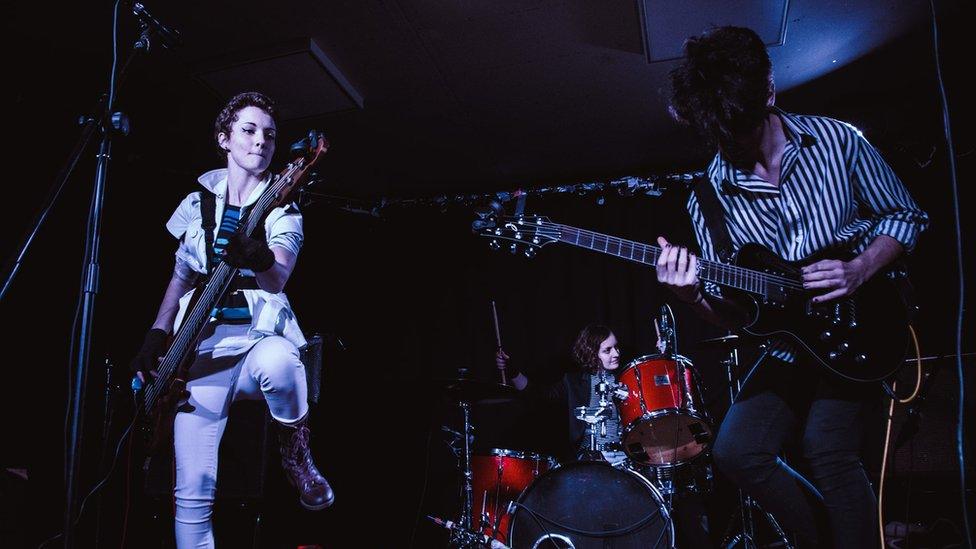
Ali (left) formed Idealistics as a teenager with her partner George Gillott and sister, Dom, on drums.
The response to her campaign has been "overwhelming", however. Hirsz hit the £1,000 goal within 24 hours, and has since increased her target to £5,000.
"Because the surgery's not been done before, we don't know exactly how much it's going to cost," she explains.
"I know it's a hard time for everyone," she adds, "so all these donations mean everything."
Disabled musicians 'on a tightrope'
Hirsz says her story is typical of disabled musicians, who have found themselves left high and dry by the Covid-19 pandemic.
Singer-songwriter Chloe Mogg, who has both fibromyalgia and chronic fatigue syndrome, agrees the last six months have been "really, really tough".
"The NHS is doing an amazing job at the moment but, especially with chronic fatigue syndrome, it seems like all the invisible illnesses have been pushed to the side," she says.
"We're walking on a tightrope and we don't know if we're going to fall off at any stage."
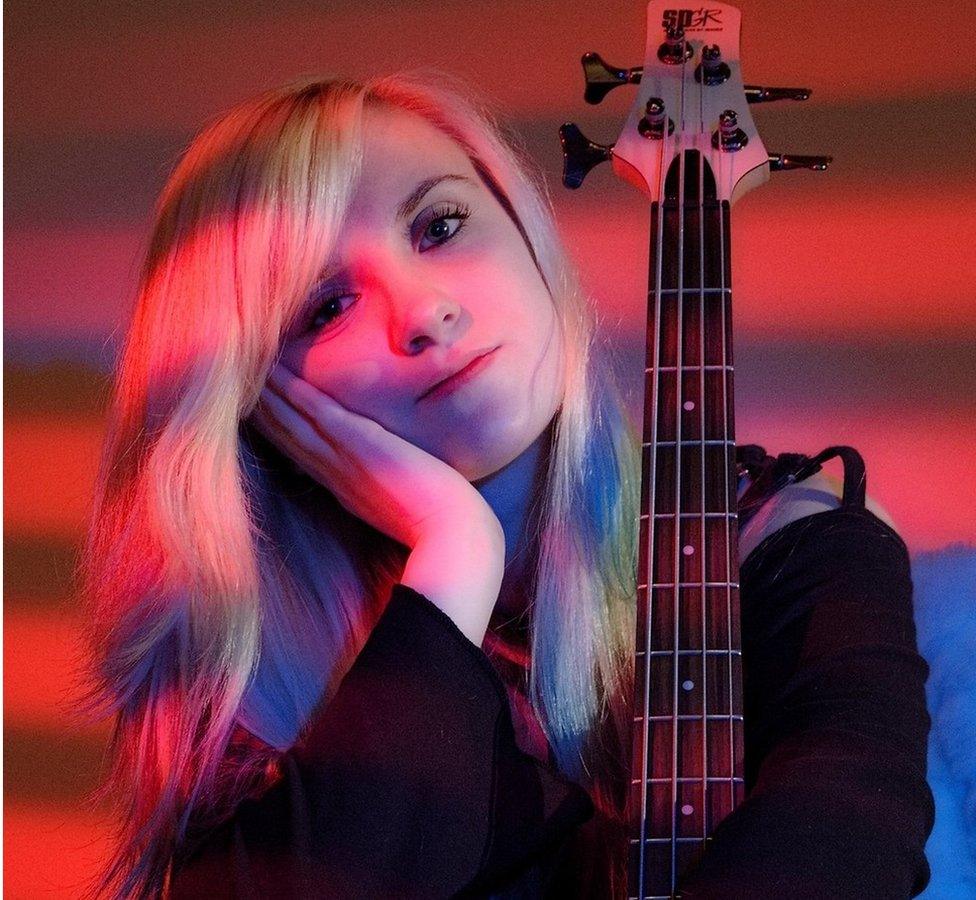
Mogg says she has faced discrimination from venues and promoters because of her condition
But Mogg, like Hirsz, has approached the pandemic with imagination and resilience, channelling her energies into organising an online music and arts festival.
Called The 7 Arts Still Exist, external, it highlights the work created by artists, designers, sculptors, writers, musicians, dancers and photographers during the pandemic. Mogg is already lining up its third event with her childhood friend Amy Crouch.
The musician says the pandemic has taught her to "live more in the present moment", even when "it felt like I've been put on pause".
"It's been tough for me and it's been tough for a lot of musician friends who have anxiety problems," she says.
"It's something we're learning to adapt to - but I don't feel like we should be needing to adapt. It's really, really tough."
For visually-impaired sitar player Baluji Shrivastav, adaptability has been the watchword for the last six months.
The 70-year-old, who has played with Oasis, Stevie Wonder, Massive Attack, Kylie Minogue and Coldplay, cannot travel during the pandemic, making it "very difficult to perform anywhere".
"But we still meet sometimes," he says. "We are allowed to meet six people in one place, and we have a garden so we rehearse there sometimes - but it will be difficult in the winter."
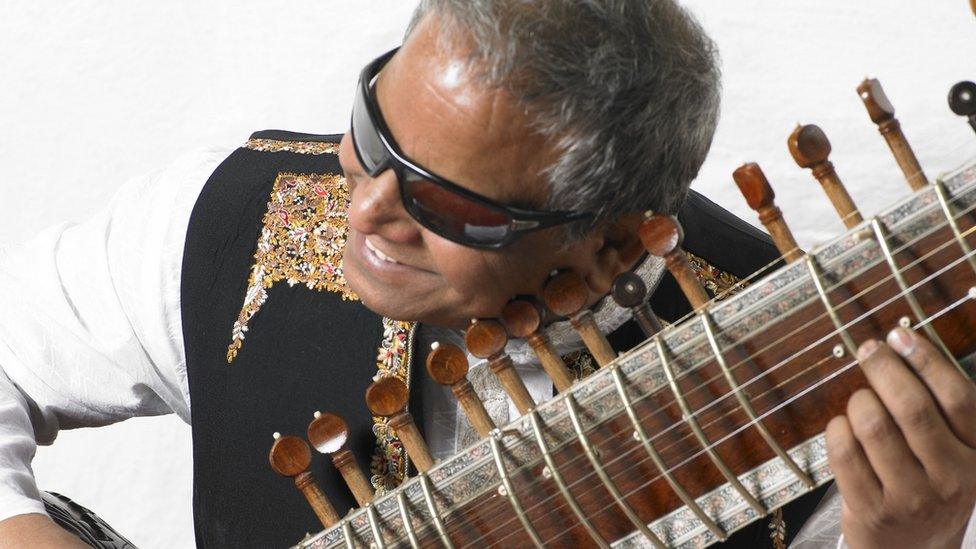
Baluji Shrivastav played at the Paralympic closing ceremony with Coldplay
Shrivastav was appointed an OBE in 2016 for his services to music, after founding the Inner Vision Orchestra, whose players are all blind or partially-sighted.
He says live-streamed concerts are harder for blind musicians, because communication between players is reliant on physical proximity. Meeting up for socially-distanced concerts poses other problems.
"Even if we can reach the venue without help, we need help within the venue itself," he says. "It's a constant difficulty for visually-impaired people.
"And, of course, financially, we are not earning at all."
'Risk of invisibility'
According to the UK Disability Arts Alliance #WeShallNotBeRemoved, external, the pandemic has had a particularly negative impact on disabled people working in the creative industries.
In an open letter to the secretary of state for culture, external, Oliver Dowden MP, the alliance warned that "many disabled artists are facing long term shielding, a total loss of income, compromised independent living and the risk of invisibility in wider society".
Separately, the Audience Access Alliance - which represents 12 disability charities in the UK - says it is "deeply concerned" that disabled people will miss out on access to gigs, theatre and sport when venues reopen because of extra Covid-related precautions and restrictions.
"If we want to 'build back better', it's vital that we build back for all," the organisation wrote in an open letter, external to the live music industry earlier this month.
The fear for both organisations is that the progress made since the UK's equality act came into force 10 years ago will be lost.
Ridiculed
Hirsz and Mogg both have horror stories about the discrimination they faced before Covid.
One promoter refused to work with Idealistics because of Hirsz's condition. "They said, 'You've got all these [feeding] tubes and nobody wants to see that. You're just going to deter a crowd,'" she recalls.
Mogg was also berated by a promoter last year, after a flare-up of fibromyalgia forced her to pull out of a show.
"He was like, 'You're a massive disappointment,'" she says. "It was so embarrassing. I felt really ridiculed and ashamed of my illness, even though it's part of me."
Despite the challenges like those, Hirsz, Mogg and Shrivastav are determined to stay active throughout the pandemic.
The Idealistics have just released their new single Memory River, external (inspired, naturally, by the Manic Street Preachers), while Hirsz is working as an advocate for disability charity Attitude is Everything.
Allow YouTube content?
This article contains content provided by Google YouTube. We ask for your permission before anything is loaded, as they may be using cookies and other technologies. You may want to read Google’s cookie policy, external and privacy policy, external before accepting. To view this content choose ‘accept and continue’.
On Monday, Shrivastav's Inner Vision Orchestra launched their first studio album, external, Indian Classical Interactions - one of three records the musician recorded in the space of a week before lockdown earlier this year. A documentary about his life will also be screened at the Bloomsbury festival, external this weekend.
And Mogg is busy finalising the third edition of The 7 Arts Still Exist, external, which will feature country artists Katy Hurt and Roisin O'Hagan.
In the meantime, she says its crucial that everyone looks out for the people around them, and asks for help when they need it.
"Just be kind, be bold and, especially if you're suffering, talk to someone and tell them how you're feeling. Because they would rather hear it now than listen to your story at a funeral."

Follow us on Facebook, external, or on Twitter @BBCNewsEnts, external. If you have a story suggestion email entertainment.news@bbc.co.uk, external.
- Published6 October 2020
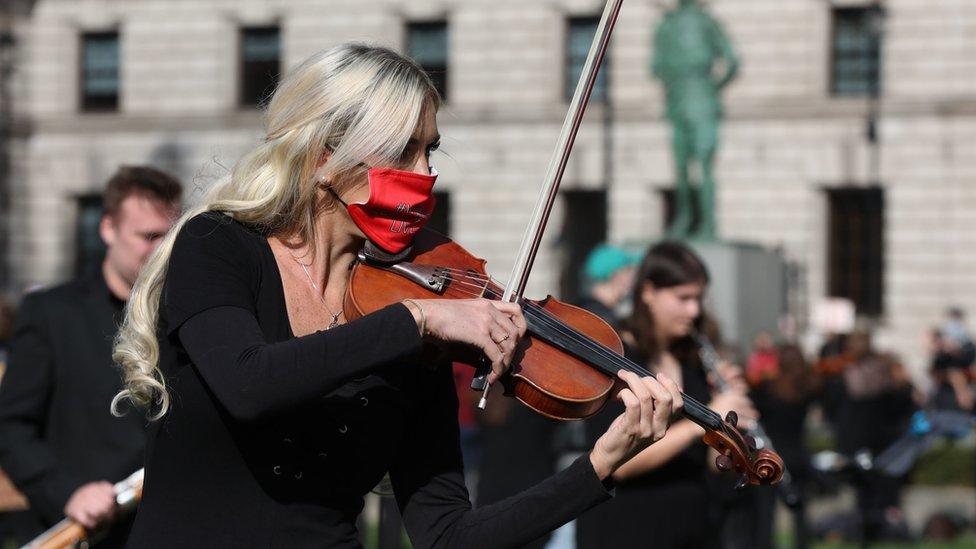
- Published5 September 2020
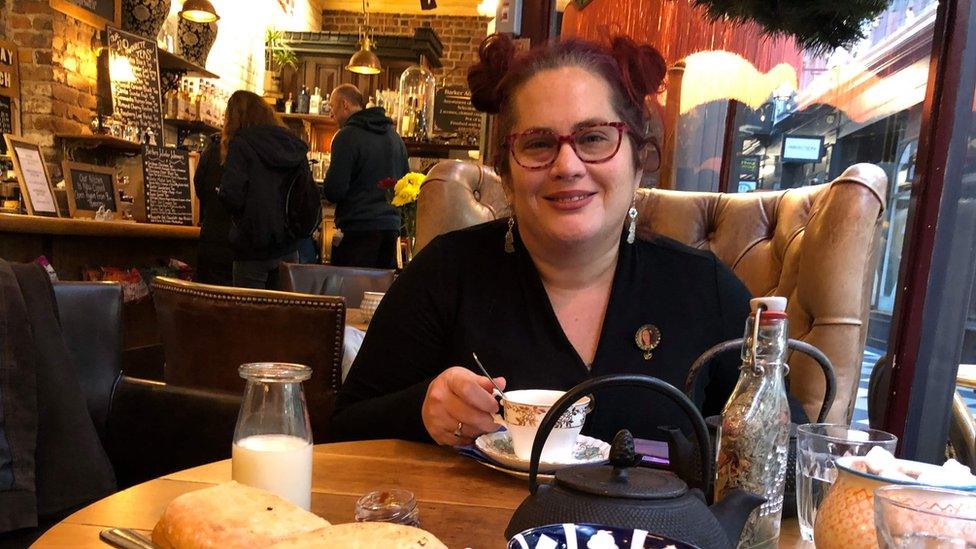
- Published13 October 2020
